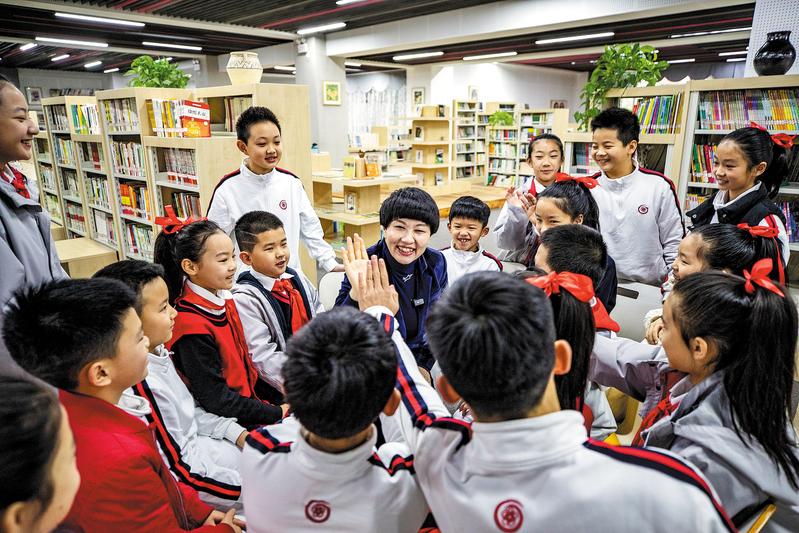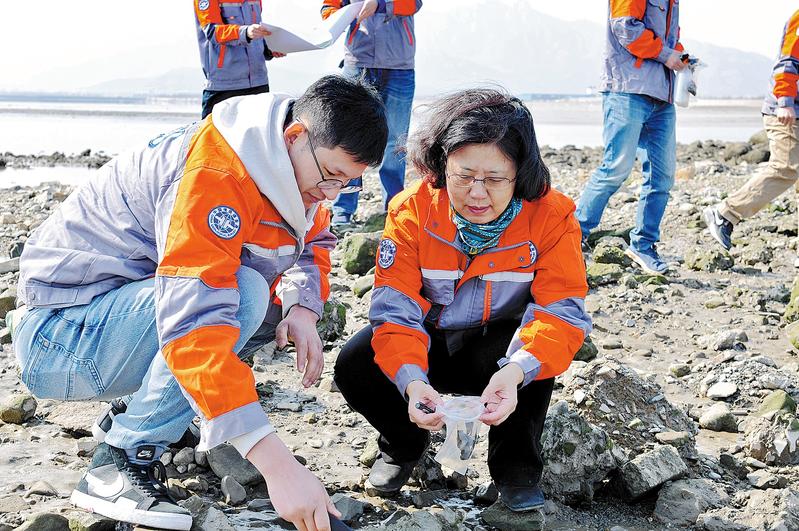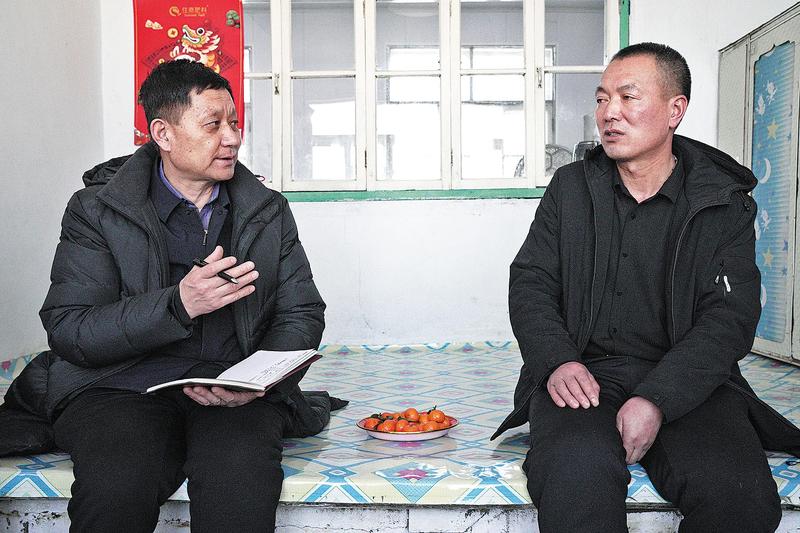Two sessions highlight China’s effectiveness in tackling grassroots problems through wide consultation
 (LI MIN / CHINA DAILY)
(LI MIN / CHINA DAILY)
On a sunny spring day last month, villagers and officials in Chitang village, Taojiang county, Central China’s Hunan province, gathered in a tidy courtyard. The topic of discussion was how to further expand the market for the village’s main products — tea-seed oil and bamboo.
Gao Ya, secretary of the Communist Party of China branch in Chitang, listened carefully and noted the villagers’ ideas. Earlier this month, she took their opinions to Beijing, about 1,300 km away, for the annual two sessions.
The just-concluded first sessions of the 14th National People’s Congress and the 14th National Committee of the Chinese People’s Political Consultative Conference offer a window into China’s whole-process people’s democracy, which involves a population of over 1.4 billion from 56 ethnic groups.
At the annual gatherings, over 5,000 national legislators and political advisers — ranging from farmers to State leaders — sit together in the Great Hall of the People in the heart of Beijing to deliberate on bills or discuss affairs of State, pool their wisdom and bring the Chinese people together to forge ahead.
“Whole-process people’s democracy is the defining feature of socialist democracy — it is democracy in its broadest, most genuine and most effective form,” President Xi Jinping, also general secretary of the CPC Central Committee and chairman of the Central Military Commission, has said.
Gao, 33, was elected as an NPC deputy in January at the annual session of the Hunan Provincial People’s Congress. Making her debut at the national legislature, she submitted suggestions on enhancing the bamboo industry and improving the construction of forest roads.
“We will focus on developing our special industries to make the villagers more prosperous,” she said.
Shen Changjian, an NPC deputy from Linli, a county in Hunan, cares more about agricultural modernization. “We need to develop smart agriculture and deepen innovation in the seed industry,” the 55-year-old vegetable grower told Xinhua News Agency.
 Liu Xiya, a deputy to the 13th National People’s Congress, talks to students at a school in Chongqing last year about the double reduction policy, which tackles the excessive amount of homework and extracurricular tutoring many children have faced. (PHOTO / XINHUA)
Liu Xiya, a deputy to the 13th National People’s Congress, talks to students at a school in Chongqing last year about the double reduction policy, which tackles the excessive amount of homework and extracurricular tutoring many children have faced. (PHOTO / XINHUA)
An amendment to the Legislation Law was reviewed at the NPC session. The draft amendment had already twice been deliberated by the NPC Standing Committee, opinions have been extensively solicited and it has been revised many times.
Sheng Hong, an NPC deputy and Party chief of a residential community in Shanghai’s Hongqiao subdistrict, noted that some suggestions put forward by her community’s residents had been included in the draft.
In November, at the legislative outreach office set up in Hongqiao by the Legislative Affairs Commission of the NPC Standing Committee, 45 suggestions regarding the draft amendment to the Legislation Law were collected through seminars and solicitation of online opinion, and were then directly delivered to the commission, according to Sheng.
“The outreach office acts as a direct link between ordinary people and China’s top legislature,” Sheng said.
In China, the growing participation of ordinary people in national and local democratic decision-making takes place in various forms.
The people’s congress system — China’s fundamental political system — guarantees that the people are the masters of the country, which is the essence of socialist democracy.
Of the 2.77 million new-term deputies to people’s congresses at all levels, 2.62 million at the county and township levels were directly elected by the country’s more than 1 billion voters.
The deputies to the 14th NPC make up a broad cross section of people, with every region, ethnic group and sector of society having an appropriate number of representatives. Of the 2,977 deputies, 497 are workers and farmers, and the number of deputies from the primary level in the total is considerable.
The two sessions reveal much about China’s democratic model, which compared with that of the West, weighs the representativeness of the people better, an article published on the website of Canal 6 Television in Mexico has noted.
In China, electoral democracy and consultative democracy are advanced in a coordinated manner. The extensive, multilevel and institutionalized development of consultative democracy boasts many channels, which can achieve the greatest possible convergence of interests.
 Yin Haiping (right), a deputy to the 13th NPC, takes sand samples at a beach in Qingdao, Shandong province, last year. (PHOTO / XINHUA)
Yin Haiping (right), a deputy to the 13th NPC, takes sand samples at a beach in Qingdao, Shandong province, last year. (PHOTO / XINHUA)
The 14th CPPCC National Committee has set up a new group for members from environmental and resource-related circles. The move will give full play to the CPPCC’s role as a specialized consultative body, and is conducive to strengthening democratic oversight and advancing ecological conservation.
Setting up the new group is “a robust measure to advance the modernization of harmony between humanity and nature, which is one of the five features of Chinese modernization”, said Pan Biling, a national political adviser and president of Xiangtan University in Hunan.
The handling of suggestions and proposals made by national lawmakers and political advisers embodies the effectiveness of China’s democracy. Last year, offices and departments at the State Council, China’s Cabinet, handled 8,721 suggestions from NPC deputies and 5,865 proposals submitted by CPPCC National Committee members, accounting for 94.8 percent and 95 percent of the total number of suggestions and proposals, respectively.
Meanwhile, dynamic and pragmatic consultations in various forms at the grassroots level contribute to good governance.
At a consultation early this year in a community in Hengshui, a city in North China’s Hebei province, residents raised issues such as leaks in the roofs of storage rooms and lack of fitness facilities.
“Such things may seem trivial, but they are related to people’s sense of happiness,” said Wang Lansuo, a retired worker. “Here everyone speaks openly to resolve the issues through discussion.”
Fan Yun, a national legislator and chairperson of Shanghai Fushen Appraisal and Consulting Group, shared two stories about performing her duties, which have brought her a sense of accomplishment over the past five years.
The first was a suggestion concerning the platform economy, which contributed to the issuance of national anti-monopoly guidelines for the sector.
The second was that her speech during an annual NPC session attracted the attention of the government. It was about a remote mountain village in East China’s Anhui province, which she had visited many times to conduct research.
 NPC deputy Sun Bin (left) discusses issues with a local resident to collect suggestions in a village in Huanan county, Heilongjiang province, in February. (PHOTO / XINHUA)
NPC deputy Sun Bin (left) discusses issues with a local resident to collect suggestions in a village in Huanan county, Heilongjiang province, in February. (PHOTO / XINHUA)
Eventually, a concrete road was built to connect the village with the outside world, fulfilling the desire of generations of villagers, who improved their living standards by developing homestays and the tea industry.
Whether democracy is good or not depends on this: Does it ensure that people lead better lives? Whole-process people’s democracy ensures that development is for the people and by the people, and that its fruits are shared by the people.
In the past five years, various departments at the State Council have adopted more than 18,000 suggestions and proposals from national lawmakers and political advisers.
Subsequently, more than 7,800 policy measures were introduced that provided solutions to a large number of problems related to reform and development, as well as people’s urgent needs.
“China’s democracy is definitely not a sham, nor an ornament, but a truly effective democratic political system with Chinese characteristics,” said Fan, who has served as an NPC deputy for 15 years.
Democratic supervision is an important part of whole-process people’s democracy.
For example, since 2018, the NPC Standing Committee has focused on prominent problems in the field of ecological and environmental protection, carrying out law-enforcement inspections for five consecutive years. Last year, enforcement inspections of the Yangtze River Protection Law were conducted, promoting better protection of China’s longest waterway in accordance with the law.
Yang Huifang, a national legislator and a teacher at a preschool special education center in Quzhou county, Hebei, is concerned about the mental health of “left-behind” seniors and children in rural areas, and she hopes that institutionalized support for these groups can be provided at the grassroots level.
She believes that China’s modernization improves the overall well-being, and that attention should be paid to improving the quality of life among vulnerable groups.
Jean Christophe Iseux von Pfetten, chairman of the Institute for East-West Strategic Studies in the United Kingdom, once took part in a municipal-level CPPCC session as a specially invited member in Jilin province.
Based on his personal experience, he said that China’s democratic practice is devoted to solving practical problems.


